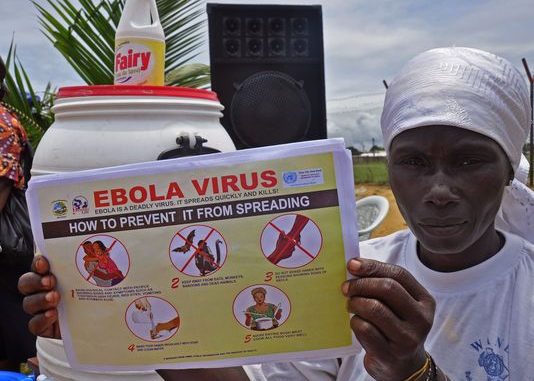
Liberia has confirmed it’s third Ebola case, and is investigating a possible link to the outbreak through animals.
According to Reuters [1]:

BYPASS THE CENSORS
Sign up to get unfiltered news delivered straight to your inbox.
You can unsubscribe any time. By subscribing you agree to our Terms of Use
Latest Video
Dr Moses Massaquoi, case management team leader for Liberia’s Ebola task force, said the three villagers who had tested positive for the disease “have a history of having had dog meat together.” Dog meat is commonly eaten in Liberia.
The first new Liberian sufferer, 17-year-old Abraham Memaigar, died on Sunday in the village of Nedowein, about 50 km (30 miles) from the capital Monrovia. Two others have since tested positive in the village.
Some locals said Memaigar and others in the village had recently dug up and eaten a dead dog.
It has not been proved that dogs can carry the virus, although humans have been infected by eating monkey flesh in past outbreaks. A number of West African nations have banned the consumption of bush meat as a precaution.
Massaquoi said the response team was investigating whether domestic animals might be carrying the virus and was also checking on deaths of hundreds of cattle in remote Lofa county.
Liberia, worst hit by the West African Ebola outbreak last year, had been declared Ebola free on May 9 even as more cases emerged in neighboring Sierra Leone and Guinea. Liberia accounts for more than 4,800 of the 11,220 deaths in the West African outbreak.
“The two (latest) live cases are 24 years old and 27 years old. They are stable,” Deputy Health Minister Tolbert Nyenswah said on Thursday.
None of the new victims is known to have traveled to Guinea or Sierra Leone, and Nedowein is far from the borders, leading to speculation that there could be hidden pockets of the virus or new means of transmission.
President Ellen Johnson Sirleaf told Reuters: “There is no need to panic. Our health team is on top of it. It will be contained.”
However, a pay dispute might disrupt health care and workers protested for a second day on Thursday.
The International Federation of Red Cross and Red Crescent Societies said the new Ebola cases pointed to gaps in Liberia’s basic infection control, adding that improvements are needed to prevent outbreaks in a region where the virus could be endemic.
A U.S. military operation that helped Liberia’s government counter the outbreak has mostly withdrawn. But the Centers for Disease Control and Prevention (CDC), a U.S. health body, said it was working with authorities to study the origin of the cases and stop the virus spreading.
Residents in Nedowein were baffled.
“An Ebola case being reported in the middle part of Liberia is confusing,” said Adolphus Gbinee, Memaigar’s uncle. “We do not have cases at our borders, not even in Monrovia. How could Ebola jump over those places and come here in Nedowein?”
Another possibility is that the virus survived among humans in remote areas. Ebola’s symptoms are often muddled with other tropical diseases, like malaria.
“There may still be clusters of EVD (Ebola) within Liberia that have been smoldering on without the knowledge of any authorities,” Ian Mackay, a virologist at Australia’s University of Queensland, wrote in his blog.
Sexual transmission is also possible. The virus can persist in semen for up to 90 days, versus 21 days in blood or vomit.
Nyenswah said health officials were monitoring 175 people believed to have come into contact with the three cases, though none had yet exhibited symptoms.
“There is no further spread of the virus to any part of the country as we speak,” he said.
Separately, Democratic Republic of Congo, which has periodic Ebola flare-ups, is investigating a possible outbreak in a village. Central Africa has a different strains of the virus.
Sources:
[1] http://www.reuters.com/article/2015/07/02/us-health-ebola-liberia-idUSKCN0PC0WJ20150702


